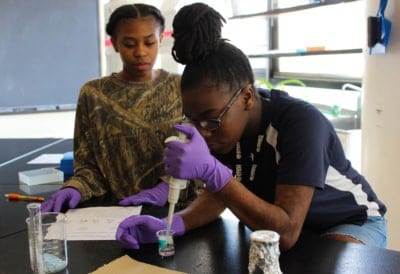Share this story
|
|
More high school students across the state of North Carolina have been taking and passing Advanced Placement (AP) courses and exams.
After participation fell during the pandemic, the boost in students sitting for AP tests has now outpaced the national average. As performance went up, the gap also closed for Black and Hispanic students.
In data collected by the College Board, the number of North Carolina students taking at least one AP exam last school year increased by 11.2% from the 2021-22 school year. The state outpaced the nation as a whole, for which AP participation increased last year by 7.6% from the previous year.
In total, 75,489 students in the state’s public schools took 136,483 AP exams last year. Among them, 80,792 received a proficient score of 3 or higher. This was 15.4% higher than in 2021-22 and 9.3% higher than 2018-19.
The nation’s one-year increase in proficient scores was 11.2% from 2021-22 and 4.1% from 2018-19.
Sneha Shah-Coltrane, director of advanced learning and gifted education for the N.C. Department of Public Instruction (DPI), credits the improvement to the state’s investment in the courses.
“Not only are we broadening access to advanced level courses for students,” Shah-Coltrane said, “we are also supporting their success. We are making sure students have access to AP courses and also the high-quality education and support they need to be successful. We will continue to work with our schools for equity and excellence — so that each student has the opportunity to be their best.”
During the pandemic, school closures and switches to virtual or hybrid classroom formats disrupted the traditional education environment. Data showed that these disruptions impacted performance in nearly all test areas during the 2020-21 school year — lowering scores across nearly all end-of-year tests and the ACT. Though most students were able to progress during the pandemic, according to DPI, it was at a slower pace than they would have during the 2018-19 school year — used as “business as usual data” for reference.
Passing AP tests are an indicator of whether students will complete all four years of college, the College Board says. It is also a pathway for students to earn credit for college courses and ultimately save on costs.
North Carolina is one of 12 states to provide fully funded AP exams for all public school students.
Historically, Black and Brown students have been less likely to be identified as Academically or Intellectually Gifted (AIG), meaning they are excluded from higher-level courses, honors classes, and AP programs.
In 2021, new AIG standards were intentionally developed to guide districts through incorporating more thoughtful and equitable programs. The revision came after the release of N.C. DPI’s call to action guidebook. Schools “must assure that students’ racial, ethnic, economic, or other demographic factors do not reduce their likelihood of access and successful participation in advanced programming,” according to the document.
Since the 2020-21 school year, the number of Black and Brown students identified as AIG has increased, but only by the slim margins of 0.27 % and 0.43% respectively.
However, with more efforts to encourage students to participate in these courses, 14.7% more Black students and 13.3% more Hispanic students took AP exams last year compared to statistics from 2021-22. In the same year, the amount of Black students scoring a 3 or higher jumped 21.8%. For Hispanic students, it jumped 23.3%.
The College Board encourages state and district leaders to announce support for AP programs at the beginning of every academic year. When expressed, this can also boost participation and close equity gaps.
“We could not be prouder of our students, families, and teachers for their dedication and accomplishments,” state Superintendent Catherine Truitt said. “They have worked hard to ensure that students are prepared, engaged, and successful in AP courses.”




